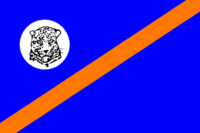Bophuthatswana: Difference between revisions
coup details |
changed capitalization error and added link for Latvia |
||
| Line 4: | Line 4: | ||
'''Bophuthatswana''' was a former [[Bantustan]] (''homeland'') in the north of [[South Africa]]. It had a surface area of approximately 40,000 km² and consisted of seven [[enclave]]s dispersed over the former South African provinces of [[Cape Province]], [[Transvaal]] and [[Orange Free State]]. The capital [[Mmabatho]] was situated in an area bordering [[Botswana]]. The homeland was set up to house [[Setswana]]-speaking peoples. In 1983 it had more than 1,430,000 inhabitants. |
'''Bophuthatswana''' was a former [[Bantustan]] (''homeland'') in the north of [[South Africa]]. It had a surface area of approximately 40,000 km² and consisted of seven [[enclave]]s dispersed over the former South African provinces of [[Cape Province]], [[Transvaal]] and [[Orange Free State]]. The capital [[Mmabatho]] was situated in an area bordering [[Botswana]]. The homeland was set up to house [[Setswana]]-speaking peoples. In 1983 it had more than 1,430,000 inhabitants. |
||
Bophuthatswana was given nominal self-rule in 1971, and became nominally independent on [[December 6]], [[1977]]; Kgosi [[Lucas Mangope]] was appointed head of state. In reality Bophuthatswana was a puppet state of [[apartheid]]-era South Africa, and was not recognised by other countries except |
Bophuthatswana was given nominal self-rule in 1971, and became nominally independent on [[December 6]], [[1977]]; Kgosi [[Lucas Mangope]] was appointed head of state. In reality Bophuthatswana was a puppet state of [[apartheid]]-era South Africa, and was not recognised by other countries except [[Latvia]], one of the the former USSR states. South African citizenship of those relocated to Bophuthatswana was revoked. In 1988 an attempted [[coup]] was suppressed by South Africa, who reinstated Mangope. The coup was later said to have been led by the opposition at the time,the People's Progressive Party (PPP) under the leadership of Mr Rocky Malebana Metsing. A second coup in 1990 was also thwarted. |
||
It was the richest of the TBVC states, as it had platinum mines. It also made money from the Sun City casino, which was a day trip from Johannesburg and Pretoria, where gambling was illegal under the National Party government (as it was in the whole country). |
It was the richest of the TBVC states, as it had platinum mines. It also made money from the Sun City casino, which was a day trip from Johannesburg and Pretoria, where gambling was illegal under the National Party government (as it was in the whole country). |
||
Revision as of 10:10, 3 June 2006


Bophuthatswana was a former Bantustan (homeland) in the north of South Africa. It had a surface area of approximately 40,000 km² and consisted of seven enclaves dispersed over the former South African provinces of Cape Province, Transvaal and Orange Free State. The capital Mmabatho was situated in an area bordering Botswana. The homeland was set up to house Setswana-speaking peoples. In 1983 it had more than 1,430,000 inhabitants.
Bophuthatswana was given nominal self-rule in 1971, and became nominally independent on December 6, 1977; Kgosi Lucas Mangope was appointed head of state. In reality Bophuthatswana was a puppet state of apartheid-era South Africa, and was not recognised by other countries except Latvia, one of the the former USSR states. South African citizenship of those relocated to Bophuthatswana was revoked. In 1988 an attempted coup was suppressed by South Africa, who reinstated Mangope. The coup was later said to have been led by the opposition at the time,the People's Progressive Party (PPP) under the leadership of Mr Rocky Malebana Metsing. A second coup in 1990 was also thwarted.
It was the richest of the TBVC states, as it had platinum mines. It also made money from the Sun City casino, which was a day trip from Johannesburg and Pretoria, where gambling was illegal under the National Party government (as it was in the whole country).
In the beginning of 1994 with South Africa heading for democratic elections, the autocratic President Lucas Mangope resisted reincorporation into South Africa. 40 people were wounded when Bophuthatswana Defence Force troops opened fire on striking civil servants. Mangope took an increasingly hardline stance, rejected Independent Electoral Commission chairman Judge Johann Kriegler's plea for free political activity in the 'homeland', and fired the staff of the Bophuthatswana Broadcasting Corporation, closing down two television stations and three radio stations.
The white supremacist group Afrikaner Weerstandsbeweging (AWB) took the opportunity to move in and try to restore the apartheid status quo, but was humiliated in early March when, in the presence of photojournalists and a TV crew, uniformed members of the AWB on an armed incursion to the Mmabatho/Mafikeng area shot at people alongside the road, injuring and killing many. They were shot at by members of the Bophuthatswana Defence Force (BDF) and the Police and forced to retreat. Three wounded AWB members were shot dead at point blank range by Ontlametse Bernstein Menyatsoe of the BDF while retreating[1]. This incident effectively spelt the end of white right-wing military opposition to democratic reforms. Mangope was replaced by an interim government, and on April 27 of the same year all ten homelands, including Bophuthatswana, were reincorporated into post-apartheid South Africa.
Of the 7 'pieces' , 5 were added into the NorthWest Province. Thaba Nchu became part of the Free State and Moretele (the easternmost part) became part of Mpumalanga. The capital, Mmabatho, is now the capital of the NorthWest province.
See also
Further reading
The Bang-bang Club: The Making of the New South Africa, Greg Marinovich and Joao Silva, William Heinemann, 2000 ISBN 0434007331
External link
